Making a Better World | Human Health
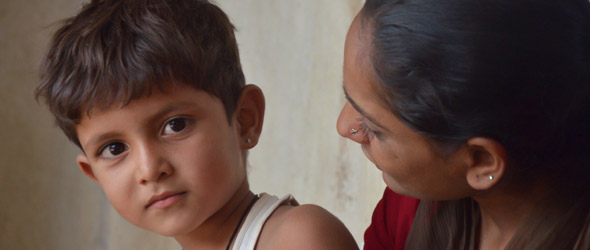
MIT aims to leverage research innovations to make health care affordable and universally available. MIT's humanistic fields — in the social sciences, arts, and humanities — contribute to this goal through a vast research portfolio on the political, cultural, historical, and economic dimensions of health and health care, as well as through research that informs public policy.
Removing barriers
This focus includes conducting research that reveals and proposes solutions to the barriers that prevent people from receiving proper heath care, including inequities in education, civil rights, and economic well-being.
MIT SHASS faculty also teach every MIT undergraduate. By empowering MIT students with political, economic, cultural, and historical perspectives — as well as skills in critical thinking, languages, and communication — the School increases the capacity of every MIT graduate to serve the world well, across the broad range of humanity's challenges.
Selected Stories
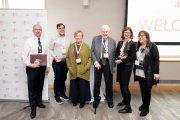
Shining a spotlight on local science journalism
The Knight Science Journalism program’s Victor K. McElheny Award honors outstanding local and regional journalists’ reporting on science, public health, tech, and the environment.
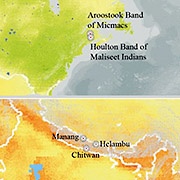
SOLVING CLIMATE
Conversations at the Frontline of Climate Change
Novel communications infrastructure from the MIT Civic Design Initiative aims to support communities on the frontlines of the climate crisis.
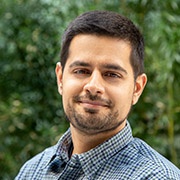
MEET OUR STUDENTS | MIT HASTS
Illuminating deeper histories: Rijul Kochhar
MIT HASTS PhD candidate Kochhar tracks changing global medical and microbial realities. "My job as an anthropologist is to track the ruination of antibiotics in cultural life, and to examine what is being done" about it," says Kochhar. Part of his quest is to resurrect neglected—but successful—techniques of the past in order to help control bacterial life in the present.

PANDEMIC
Webinar Series | History of Now: Plagues & Pandemics
In the spring of 2020, as people around the world confronted the daily reality of the Covid-19 pandemic, many wondered how previous generations navigated similar crises. At MIT, an interdisciplinary team of humanistic faculty explored this question in a course that broke ground as a live, free MIT class, held in an open public webinar format so that anyone who wanted to attend could do so, from anywhere in the world.

IN THE CLASSROOM | PANDEMIC
For the pandemic, MIT History opens a course to the public via a free, live webinar format.
Hundreds from around the world responded to the opportunity and joined MIT students in the weekly class, "History of Now: Plagues and Pandemic." The experimental webinar format also greatly expanded the scope of expertise available to students, bringing in speakers from fields ranging from microbial biology to economics.

U.S. HEALTHCARE SYSTEM
What has the pandemic revealed about the U.S. healthcare system — and what needs to change?
Seven MIT scholars see lessons and opportunities for U.S. healthcare

SOLVING CLIMATE
On planetary change and human health
MIT anthropologist Amy Moran-Thomas reflects on the deep connection between planetary and human well-being: “When I think of health now, I think of the disarray in bigger ecosystems and infrastructures that is also landing in human bodies.”

THE MEANING OF MASKS
The Masks of Empire, Art, Politics, and War | Catherine Clark
"Ultimately, history reminds us that masks can produce meaning whether they sit on our faces or our kitchen tables."

THE MEANINGS OF MASKS
Masks can reveal new possibilities
Manduhai Buyandelger | Anthropology
"In shamanic rituals and in computer-mediated virtual reality, a mask conceals one identity to reveal new possibilities. Seen in this light, virus protection masks offer an opportunity to replace a visage of fear with a public expression of strength as a community." — Manduhai Buyandelger, MIT Associate Professor of Anthropology
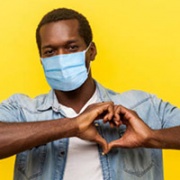
PERSPECTIVES FOR THE PANDEMIC
Series | The Meanings of Masks
As The Washington Post has reported, "at the heart of the dismal US coronavirus response" is a "fraught relationship with masks." In this series of short commentaries, MIT faculty delve into the historic, creative, and cultural meanings of masks, offering new ways to think about, appreciate, and practice protective masking — currently a primary way to save lives and to contain the Covid-19 pandemic.

PANDEMIC
Research + Resources for the Pandemic
Research and commentary from the MIT SHASS faculty and graduate students to inform policy and increase public understanding about the complex pandemic landscape. Content areas include the impacts of the pandemic on healthcare, the economy, education, the 2020 elections, daily life, and democracy. There is also a channel with music and other creative works that offer contemplative space, meaning, and uplift.
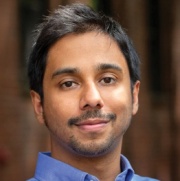
Blood and politics in India
New book explores the use of blood in political rhetoric, imagery, and activism, and even the politics of blood drives.

MEET OUR DOCTORAL STUDENTS
Meet Timothy Loh, doctoral student in the MIT HASTS program
“MIT is the best place to be an anthropologist studying issues of science and technology. It’s a place where we’re able to think deeply and critically about how scientific knowledge and authority is constructed."
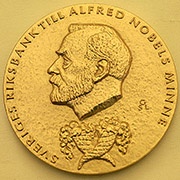
HONORS AND AWARDS
MIT economists Esther Duflo and Abhijit Banerjee win the Nobel Prize
Duflo and Banerjee, whose work has helped transform poverty alleviation, are co-winners of the 2019 Sveriges Riksbank Prize in Economic Sciences in Memory of Alfred Nobel, along with another co-winner, Harvard University economist Michael Kremer.
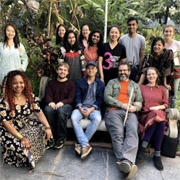
Co-designing assistive technologies in India
MISTI students connect with premier Indian institutes, hospitals, and students to collaborate on “humanistic” assistive design.
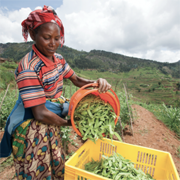
HUMAN HEALTH
J-PAL develops guide to measure women and girls' empowerment
In order to design effective policies and programs, researchers, policymakers, and practitioners must be able to accurately measure women’s and girls’ empowerment. A new research resource from the SHASS-based Abdul Latif Jameel Poverty Action Lab (J-PAL) addresses this challenge.
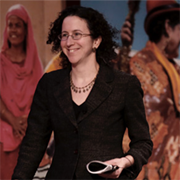
HUMAN HEALTH | ECONOMICS
Amy Finkelstein emphasizes the value of late-in-life health care spending
Study debunks notion that large chunks of Medicare go to futile end-of-life care

HUMAN HEALTH
Jasmin Joseph: "I love the idea of making an impact on global health"
MIT senior and varsity softball co-captain brings positivity and determination to life-saving biology research.
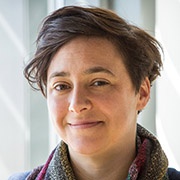
Q&A with historian Caley Horan
On innovation, risk-taking, and cultural transformation
Assistant Professor Caley Horan is an historian of the U.S. interested in the cultural and intellectual transformations of the post-WWII era. SHASS Communications spoke with her about her book manuscript, Actuarial Age, which explores the cultural life of insurance and the role of risk-based thinking in shaping American institutions and daily life during the second half of the twentieth century.

HUMAN HEALTH
How often do medical problems lead to bankruptcy?
A new study, co-authored by MIT economist Amy Finkelstein, finds that poor health is a less common cause of bankruptcy than commonly thought, but that it brings other economic woes.

HUMAN HEALTH
Ouch: Study reveals financial pain after hospitalization
A study co-authored by an MIT economist reveals that hospitalization and the health problems that cause it lead to a 20 percent drop in earnings and an 11 percent drop in employment for adults between ages 50 and 59, among other negative effects.

HUMAN HEALTH
Hospitals that spend more on emergency care yield better outcomes
A study co-authored by MIT economists finds that investing more in inpatient care relative to longer-term nursing facilities reduces mortality rates.
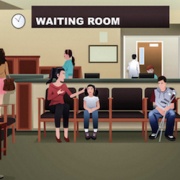
HEALTH ECONOMICS
Testing their patients
MIT researchers have found that Medicaid recipients are 20 percent more likely to wait more than 20 minutes to begin a scheduled appointment, compared to privately insured patients.
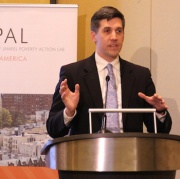
SOCIAL INNOVATION | HUMAN HEALTH | CITIZENSHIP
Government leaders gather at MIT to advance evidence-based policymaking
State and local policymakers joined with leading researchers to share experiences overcoming challenges to evaluating government programs.
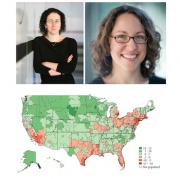
SOCIAL INNOVATION | HUMAN HEALTH
Measuring "diagnostic intensity"
New study maps U.S. regions where patients appear more ill than they are.
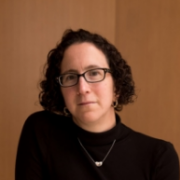
HEALTH ECONOMICS
Study: With Medicaid, ER visits remain high for two years
People enrolled in Medicaid significantly increase their emergency room visits for at least two years after they first sign up, according to a new study co-authored by an MIT economist. The finding will likely surprise those health care experts who have projected that people would make fewer ER visits after acquiring health insurance.
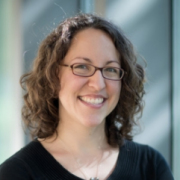
HEALTH ECONOMICS
Making a splash in health care economics
MIT economist Heidi Williams has developed a distinctive method of trying to answer the questions that intrigue her. For each new study, she essentially builds an all-new data set from the ground up, linking scientific records about medical research with economic and financial records.

HEALTH ECONOMICS | MIGRATION AND NUTRITION
Migrants pay more for their home region’s cuisine, even when on the edge of malnutrition
A new study from MIT economist David Atkin reveals that migrants who hang on to their old cuisines often pay more to eat. In turn, poor migrants on tight budgets must reduce the amount of calories they can consume, sometimes pushing them to the cusp of malnutrition.

RESEARCH TO POLICY | HEALTH
How Medicaid affects adult health
Study: Having health insurance helps lower-income Americans avoid depression, diabetes, and catastrophic financial shocks related to health care.

HEALTH ECONOMICS
New study shows rich, poor have huge mortality gap in U.S.
Poverty in the U.S. is often associated with deprivation, in areas including housing, employment, and education. Now a study co-authored by two MIT researchers has shown, in unprecedented geographic detail, another stark reality: Poor people live shorter lives, too.

GLOBAL HEALTH AND POVERTY ALLEVIATION
A Sampler of Health Sector projects
Abdul Latif Jameel Poverty Action Lab at MIT
J-PAL’s Health sector aims to encourage health-promoting behaviors and improve the delivery of health care services, as well as to better understand the impact of health care on reducing poverty.
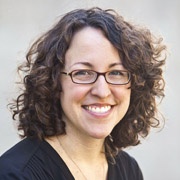
3 Questions with economist Heidi Williams
On the economics of healthcare innovation
MIT economist, and 2015 MacArthur "genius grant" recipient, discusses how updated policies and tweaks to the R&D pipeline could create more drugs for prevention, and for treating cancers at earlier stages.

RESEARCH TO POLICY: ENVIRONMENT + HEALTH
The high value of water
A study by MIT economist Esther Duflo finds evidence that people willing to pay more for running water report much higher levels of happiness when they have it.

RESEARCH TO POLICY: HEALTHCARE
Caught in the social safety net
Andrea Campbell gives a firsthand perspective on the effects of means-tested social insurance programs. The single biggest flaw with means-testing, in Campbell’s view, is that the income limits and other restrictions can make it harder for people to break free of social insurance programs.

RESEARCH TO POLICY: ENVIRONMENT AND HEALTH
JPAL launches U.S. State and Local Innovation Initiative
A transformative new program from the Abdul Latif Jameel Poverty Action Lab at MIT-SHASS will partner with U.S. state and local governments find solutions to public policy issues across a wide range of social issues including crime, education, employment, health, and housing. Selected governments will receive access to JPAL researchers to help them design and implement randomized evaluations and use the results to make evidence-based decisions for policy that really works.
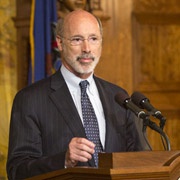
Q&A with Pennsylvania Governor Tom Wolf PhD '81
On making good policy; the politics of global issues
"The search for the answers to society’s most pressing questions always involves a political science dimension. Politics is the art of figuring out what you want to do, how you’re going to do it, and how you’re going to convince others to go along with what you want to do."
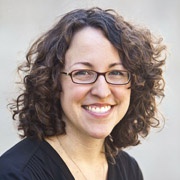
RESEARCH TO POLICY: INNOVATION ECONOMIST
Williams wins MacArthur "genius grant"
Economist who studies the economics of innovation wins $625,000 prize. Williams researches the causes and consequences of technological change in health care markets. Her broad goal is to shed light on the economics of innovation in a context — health care —that has important consequences for human health and welfare, one which is critical to national fiscal policy.

RESEARCH TO POLICY: CANCER RESEARCH
Study: Firms “underinvest” in long-term and preventative cancer research
MIT health and innovation economist Heidi Williams identifies the underinvestment, and the factors that contribute to it. She also suggests three specific adjustments to policy and to the R&D pipeline that could catalyze more research for drugs to treat early-stage cancers, and to prevent cancer.
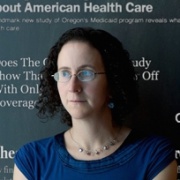
RESEARCH TO POLICY: HEALTH ECONOMICS
Measuring health care
MIT economist Amy Finkelstein spotted an opportunity to bring the gold standard in scientific research to one of the most pressing questions of the day.
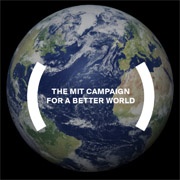
The MIT Campaign for a Better World
Announcing the new comprehensive campaign, MIT President L. Rafael Reif said, "Humanity faces urgent challenges — challenges whose solutions depend on marrying advanced technical and scientific capabilities with a deep understanding of the world's political, cultural, and economic complexities."
Discover the role of MIT's Humanities, Arts, and Social Sciences fields in solving the economic, cultural, and political dimensions of global issues, and in problem-solving in collaboration with our STEM colleagues.
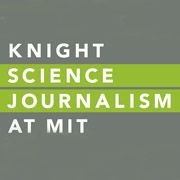
ADVANCING POLICY: PUBLIC ENGAGEMENT WITH SCIENCE
The Knight Science Journalism Fellowships at MIT
Meet the Knight Science Fellow for 2014-2015. This year MIT's Knight Science Journalism program welcomed 11 acclaimed journalists who investigate topics ranging from phenology and climate change, to medicine and human health, to quantum mechanics to hone their science reporting skills. In this article, the Fellows offer their insights on the challenges and rewards of their field.
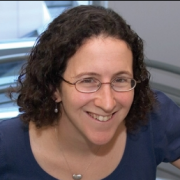
RESEARCH TO POLICY: HEALTH ECONOMICS
3 Questions: Amy Finkelstein on testing health care systems
MIT economist explains why randomized trials can improve medical care.

RESEARCH TO POLICY: HEALTHCARE
Study: More expensive emergency care does yield better results
Unique research method reveals significant return on additional health care spending.

RESEARCH TO POLICY: HEALTH
Global Health & Medical Humanities Initiative launched
“We want to bring together scholars in different fields who don’t normally have a chance to talk to each other,” said Erica Caple James, associate professor of anthropology and director of the Global Health & Medical Humanities Initiative. “With this initiative, we hope to encourage more interdisciplinary collaboration on health matters — teaching together, researching together, and mobilizing the creativity of all five MIT schools, as the Institute continues to develop its future role in improving human health.”

SOCIO-TECHNICAL COLLABORATION
MIT SHASS at SOLVE
An October 2015 conference on the MIT campus marked the launch of SOLVE — an MIT project dedicated to generating ongoing thinking, research, and collaboration to solve the world's toughest problems. Meet MIT SHASS participants in some of the initial events.

RESEARCH TO POLICY: PUBLIC HEALTH
3 Questions: Jonathan Gruber on the cost of smoking
Leading health care economist weighs in on a proposed cost-benefit analysis of smoking.
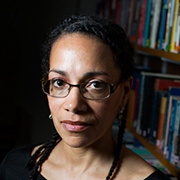
RESEARCH TO POLICY: AID ORGANIZATIONS
The anthropology of humanitarianism
Throughout Eric Caple James’ career as a medical anthropologist, she has specialized in studying people confronted with social, economic, and political uncertainty. James, now an associate professor of anthropology at MIT, has often sought to address a particular question about people placed in such difficulties: Are their psychological and civic needs being addressed by the social organizations that purport to help them?
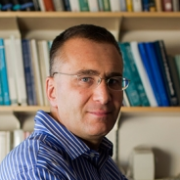
RESEARCH TO POLICY: HEALTHCARE
Gruber outlines key upcoming moments in Affordable Care Act rollout
MIT expert weighs in on health plan’s status as legislation becomes reality.

RESEARCH TO POLICY: HEALTHCARE
Study: In initial years, having Medicaid increases emergency room visits
Unique study on Oregon’s citizens sheds light on critical care in the U.S.
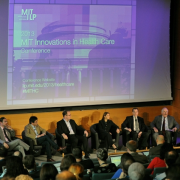
INNOVATION + HEALTH
New medical operations
At MIT’s “Innovations in Health Care” conference, industry experts discuss how to maintain quality while reining in costs.

RESEARCH TO POLICY: ENVIRONMENT + HEALTH
Innovative study estimates extent to which air pollution in China shortens human lives
A high level of air pollution, in the form of particulates produced by burning coal, significantly shortens the lives of people exposed to it, according to a unique new study of China co-authored by an MIT economist.

RESEARCH TO POLICY: HEALTH ECONOMICS
New insight into how people choose insurance plans
Study: Consumers avoid high-deductible plans if they expect to reduce their use of medical care.
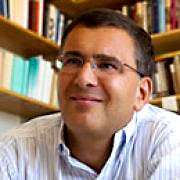
RESEARCH TO POLICY: HEALTH
The health-insurance markets of the (very near) future
“Health insurance is a confusing and difficult choice,” says Jonathan Gruber, a professor of economics at MIT who specializes in health-care issues. “It’s important that people make decisions in an organized and effective market. In that way they can make the best choices, and we can ensure the best level of competition among insurers.”

RESEARCH TO POLICY: INNOVATION
Silbey honored for lab safety research
Susan Silbey has received the 2012 Scott Award from ASA, a $25K Seed Grant from UCLA, and a grant from the MIT Simons Center for the Social Brain.
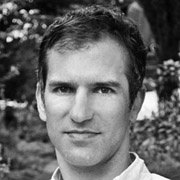
ARTS INNOVATION: WRITING, PUBLIC HEALTH POLICY
Seth Mnookin wins 2012 Science in Society Award for his book The Panic Virus
Seth Mnookin, Assistant Professor of Science Writing, and co-director of the MIT SHASS Graduate Program in Science Writing (GPSW), has been awarded the 2012 Science in Society Journalism Award for his book The Panic Virus. Of the award, given annually by the National Association of Science Writers, Tom Levenson, MIT Professor of Science Writing, notes, "This is one of the very top awards in our field. It reflects the judgment of the leading science writing association in the world and it is an honor that only comes to superlative work."
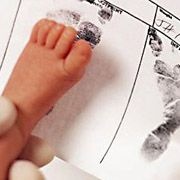
RESEARCH TO POLICY: HEALTH INSURANCE
MIT economists Finkelstein and Gruber demonstrate the health and financial benefits of Medicaid
Landmark study shows the effects of health insurance program: much better health and more financial stability for the poor; more bills paid for hospitals and doctors. Professors of Economics Amy Finkelstein (a principal investigator) and Jonathan Gruber contributed to the study.

RESEARCH TO POLICY: ECONOMICS
Economics Symposium launches MIT's 150th celebration
This symposium, organized by the School's Department of Economics and the Sloan School of Management, celebrated the role of MIT’s faculty and students in advancing the fields of economics and finance, in putting the latest developments into practice, and in contributing to the design of public policy.
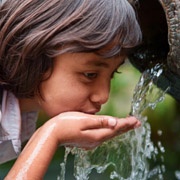
RESEARCH TO POLICY: ENVIRONMENT + HEALTH
Global water issues call on humanities and social science research
"Rethinking Water" workshop shows significance of research in the humanities and social sciences for meeting global water needs.